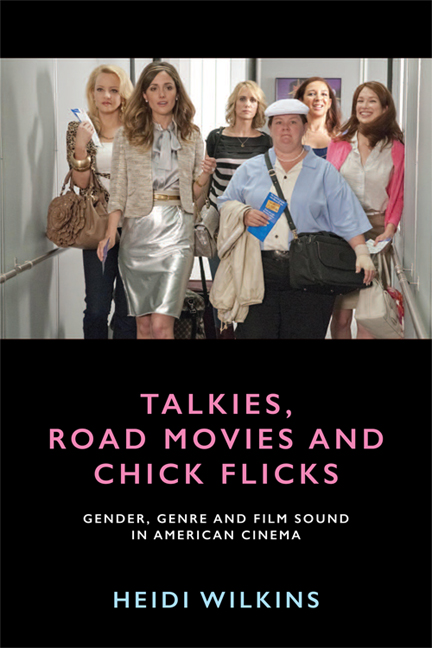Book contents
- Frontmatter
- Contents
- Acknowledgements
- Introduction
- 1 Talking Back: Voice in Screwball Comedy
- 2 All That Jazz: The Diegetic Soundtrack in Melodrama
- 3 The Alienated Male: Silence and the Soundtrack in New Hollywood
- 4 Brothers in Arms: Masculinity and the Vietnam War Movie
- 5 Subversive Sound: Gender, Technology and the Science Fiction Blockbuster
- 6 Girl Talk: The Postmodern Female Voice in Chick Flicks
- Conclusion
- Bibliography
- Filmography and Other Sources
- Index
- Frontmatter
- Contents
- Acknowledgements
- Introduction
- 1 Talking Back: Voice in Screwball Comedy
- 2 All That Jazz: The Diegetic Soundtrack in Melodrama
- 3 The Alienated Male: Silence and the Soundtrack in New Hollywood
- 4 Brothers in Arms: Masculinity and the Vietnam War Movie
- 5 Subversive Sound: Gender, Technology and the Science Fiction Blockbuster
- 6 Girl Talk: The Postmodern Female Voice in Chick Flicks
- Conclusion
- Bibliography
- Filmography and Other Sources
- Index
Summary
In the 2011 film, Friends With Benefits, while watching a romantic movie together, Dylon (Justin Timberlake) loudly speculates: ‘why do all these movies have such bad music?’ Jamie (Mila Kunis) replies ‘It's so that you know how to feel every single second’. A conversation ensues about the various musical conventions that have been established by Hollywood to code different emotive or narrative situations, including heartbreak, marriage and sneaking through an office. This self-reflexive summary, within the world of a film which is itself a romantic comedy, while suggesting a historically formulaic approach to the utilisation of sound in American mainstream cinema, also highlights the affective essence generated by music in film. It also demonstrates the extent to which audience expectations of popular film genre conventions are well-established and perhaps, based on Dylon's frustrated questioning, a need or desire for film soundtracks to do something different. Furthermore, this interchange tells us something about gender and sound in film, since Dylon, a twenty-something male is apparently unfamiliar with the film sound conventions of a romantic movie, whereas Jamie, his female counterpart, is well-aware of the intention behind this type of film soundtrack. This snippet of dialogue perhaps establishes an age old paradigm reliant on the perception that female audiences somehow innately enjoy films about romance and thus identify with romantic music, while suggesting that this ‘female’ film genre is a total mystery, or even a source of frustration, to male audiences.
This book examines a range of so-called ‘male’ and ‘female’ film genres in order to uncover the ways in which film sound conveys meanings about gender. The notion of genre has played a key role in the writing of this book, partly because genre and gender are frequently so inextricably linked: action or science fiction films seem to be so often categorised (both inside and outside of academia) as ‘male’, while romantic comedies or melodramas are deemed ‘female’. Rick Altman, in Film/Genre, highlights that genre is linked to the recognition of repeated semantic codes or conventions, leading to the categorisation of film texts based on common features.
- Type
- Chapter
- Information
- Talkies, Road Movies and Chick FlicksGender, Genre and Film Sound in American Cinema, pp. 1 - 8Publisher: Edinburgh University PressPrint publication year: 2016



